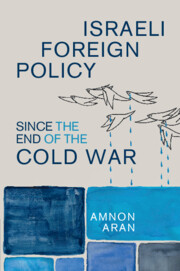Book contents
- Israeli Foreign Policy since the End of the Cold War
- Cambridge Middle East Studies
- Israeli Foreign Policy since the End of the Cold War
- Copyright page
- Dedication
- Contents
- Maps
- Figures
- Acknowledgements
- Chronology
- Abbreviations
- Maps
- Introduction
- 1 Entrenchment
- 2 Redirection
- 3 On the Brink of Peace?
- 4 Engagement Incomplete
- 5 Engagement under Assault
- 6 The Dividends of Engagement
- 7 Unpicking the Oslo Accords
- 8 Backtracking
- 9 Just Beyond Reach
- 10 Between Engagement and Unilateralism
- 11 In Search of a Foreign Policy Paradigm
- 12 A Perfect Storm
- 13 The Road Map for Regime Change
- 14 The Resurgence of Unilateralism
- 15 Events Dear Boy, Events
- 16 The End of the Road
- 17 Vulnerable Ties
- Epilogue: Israel’s Wondrous Decade?
- Appendix List of Persons Interviewed
- References
- Index
- Books in the Series
1 - Entrenchment
Published online by Cambridge University Press: 15 December 2020
- Israeli Foreign Policy since the End of the Cold War
- Cambridge Middle East Studies
- Israeli Foreign Policy since the End of the Cold War
- Copyright page
- Dedication
- Contents
- Maps
- Figures
- Acknowledgements
- Chronology
- Abbreviations
- Maps
- Introduction
- 1 Entrenchment
- 2 Redirection
- 3 On the Brink of Peace?
- 4 Engagement Incomplete
- 5 Engagement under Assault
- 6 The Dividends of Engagement
- 7 Unpicking the Oslo Accords
- 8 Backtracking
- 9 Just Beyond Reach
- 10 Between Engagement and Unilateralism
- 11 In Search of a Foreign Policy Paradigm
- 12 A Perfect Storm
- 13 The Road Map for Regime Change
- 14 The Resurgence of Unilateralism
- 15 Events Dear Boy, Events
- 16 The End of the Road
- 17 Vulnerable Ties
- Epilogue: Israel’s Wondrous Decade?
- Appendix List of Persons Interviewed
- References
- Index
- Books in the Series
Summary
Chapter 1 examines Israel’s foreign policy response to the end of the Cold War. It analyses events such as the 1991 Gulf War and the ensuing Madrid peace conference. It explains how domestic factors drove Israel to adopt a foreign policy of entrenchment amid events related to the end of the Cold War. This stance hinged on basing Israel’s regional foreign policy on its iron wall of military might rather than on diplomacy, and making peace with the Arab world in exchange for peace, not territory. The Palestinians residing in the West Bank and Gaza Strip, which Israel had captured during the 1967 Arab-Israeli war, would be granted limited autonomy, but remain under Israeli military occupation.The chapter engages with and adds to the literature on specific episodes including Israel’s response to the immediate aftermath of the Cold War, the 1991 Gulf War, and the Madrid peace conference.
- Type
- Chapter
- Information
- Israeli Foreign Policy since the End of the Cold War , pp. 12 - 32Publisher: Cambridge University PressPrint publication year: 2020

